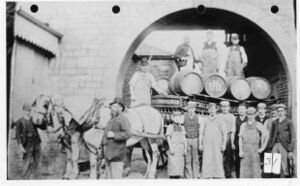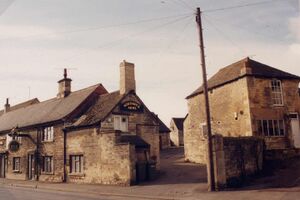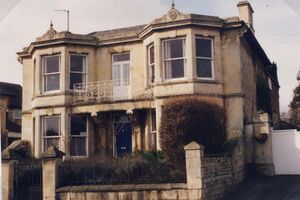W Bean & Co
W Bean & Co, Rutland Brewery, High Street, Ketton, Rutland
Trading as Molesworth & Bean in 1894 before becoming T C Molesworth & Son in 1895. Above named adopted in 1902.
Acquired by Smith & Co.(Oundle) Ltd shortly after.
THE HISTORY OF T. C. MOLESWORTH, FOUNDER OF THE RUTLAND BREWERY, KETTON, RUTLAND AND WILLIAM BEAN by Jack R Feast
Thomas Caswell Molesworth was the founder of the Rutland Brewery at Ketton, originally being a native of Lincolnshire born at Whaplode in 1821, whose first mention appears in the census of 1861 listed as a brewer and maltster, then appearing in the trade directories from 1863 onwards being listed as Thomas Caswell Molesworth brewer and maltster.
By 1876 Thomas Caswell Molesworth had taken his son into the business, he was also named Thomas Caswell Molesworth and they began trading as T. C. Molesworth and Son, sometimes appearing as ale and porter brewer or brewers and maltsters at the Rutland Brewery, the name “Rutland Brewery” only appearing in the trade directory of 1877 and from 1880 the Molesworth family also appear in the trade directories listed as farmers.
Between 1871 and 1887 Thomas Caswell Molesworth junior appears in the trade directories listed as a maltster at 29 Broad Street, Stamford, and probably in the course of his business dealings at Stamford, he may have met William Bean, who is listed in the trade directory of 1889 (Lincs) at 59 St Martins, Stamford.
The earliest connection between Thomas Caswell Molesworth (junior) and William Bean appears in a Michaelmas rent ledger of 1887 in connection with the Windmill Public House, Kings Cliffe, Northamptonshire. The general gist which reads thus: “T. C. Molesworth, the younger and Bean W. late Molesworth the elder, successor to William Cunnington late his father, The Windmill Public House”, both William Cunnington junior and senior were former brewers and maltsters in Kings Cliffe, the name William Cunnington last appearing in the trade directory of 1885.
By 1888 Thomas Caswell Molesworth (senior) was probably semi-retired taking a farm at Empingham, having sold his interests in the Rutland Brewery to William Bean, appearing in the trade directories listed as a farmer until his death in 1895 aged 74.
The 1881 census records for Ketton provide interesting information about the wealth and prosperity of the Molesworth family, as well as giving an insight about the size of the Rutland Brewery. Thomas Caswell Molesworth [senior] is listed as a farmer of 700 acres, employing 21 men and 14 boys, and Thomas Caswell Molesworth [junior] is listed as a maltster and brewer employing 8 men and 4 boys.
The partnership of T. C. Molesworth and W Bean, trading as Molesworth and Bean Brewers, lasted from 1887 until late 1894. William Bean became the owner of the Rutland Brewery in mid 1887 (I say mid 1887 because Bean W. in the Michaelmas rent ledger was written in pencil, appearing as an afterthought or an entry at very short notice) I suspect the Molesworths may have been in some sort of financial difficulty, as the Michaelmas rent ledger covers the years 1886, 1887 and 1889. In 1886 and 1887 where it appears the Molesworths were in arrears, this fact is borne out, because the partnership of Molesworth (junior) and Bean paid double the rent for the year of 1889.
The 1891 census provides the following information, listing Thomas Caswell Molesworth (senior) as a farmer at Empingham and Thomas Caswell Molesworth (junior) as a brewer, miller and farmer at Ketton and William Bean as a brewery owner, residing at 1 Belmont House (1890 to 1894) Duddington, Northamptonshire.
William Bean was the son of a JP born at Shooters Hill, Kent, in 1860 and is listed in the census of 1881 as an electro mechanical engineer aged 21.
By late 1894 William Bean had become the sole proprietor of the Rutland Brewery and Thomas Caswell Molesworth (junior) had formed a new business with Thomas Springthorpe and appears in the trade directories as Molesworth and Springthorpe, millers and stone merchants, South Luffenham. William Bean resided at Wothorpe House, Wothorpe, a small village on the outskirts of Stamford, Lincolnshire (1895 to 1905).
William Bean continued as sole proprietor of the Rutland Brewery until late 1899 - early 1900, when it appears William Bean was in negotiations with Smith & Co of Oundle to lease the Rutland Brewery, a number of public houses, property and premises, which appear in a Provisional Valuation Document at the Northampton Records Office, also an inventory and valuation for fixtures, fittings and plant at The Rutland Brewery exist dated 10th October 1899, further evidence exists confirming Smith’s lease or ownership of the Rutland Brewery from the beginning of 1901, in the form of a letterhead overprinted Smith & Co dated Jan 1st 1901, and a memo from the Rutland Brewery exists along with a further overprinted letterhead dated 1st August, 1903, which were all written by the same hand, may be William Bean himself. Although by 1902 T. Bent Wilson had been appointed manager of the Rutland Brewery. Smith & Co of Oundle were listed at Ketton in the local Stamford trade directories until 1920, although brewing had probably ceased by this time, and the brewery was demolished in 1926.
A later valuation document circa 1936 features photographs of the public houses, some of which were mentioned in the earlier provisional valuation document, plus three unrecorded public houses and it also includes The Monckton Arms from the leasehold properties. Along with the valuation documents there is an analysis of sales over the previous eight years showing an average yearly loss of approximately £300 on the leased estate of the now deceased William Bean. The assessor concludes by suggesting renegotiating the terms of the lease or terminating the present lease when it expires.
The outcome is unclear, Smith & Co may have purchased the estate of the former William Bean outright.
After the sale or lease of the Rutland Brewery and its estate, William Bean appears listed in the trade directories as a JP at Easton on the Hill. Northamptonshire from 1905 until 1912.
Few relics have survived from the Rutland Brewery other than those already detailed, but both T. C. Molesworth & Son and William Bean manufactured mineral waters. A broken patent bottle exists which dates from 1877 to the early 1880s which was used by T. C. Molesworth & Son, some ten years prior to their listing in the trade directory of 1888 as mineral water manufacturers, to my knowledge one other complete mineral water bottle exists from T. C. Molesworth & Son, and a handful of similar bottles exist from William Bean, who continued this lucrative business sideline.
Thirty plus freehold premises and four leasehold premises are featured in the earliest lease documents cover a large catchment area covering the counties of Leicestershire, Lincolnshire, Northamptonshire and Rutland, with the greatest concentration being in north Northamptonshire and Rutland.
The later lease document of 1935 lists some additional properties and does not include all the properties featured in the earlier lease document, some having fallen into disrepair and for this reason some of the licences were not renewed which led to the eventual demolition of some properties, others were sold and are now private houses.
The brewery and its business may have been bought outright by Smith & Co early in 1900 for the sum of £3,344 9/-, a figure mentioned in the Inventory and Valuation Document of October 1899. Whilst the brewery’s estate seems to have been leased, a lease that was either renewed or reviewed, probably about every five or six years looking at the various dates mentioned on the lease and valuation documents that have come to light so far.
Post Script from Mike Brown In the 1887 Brewers’ Journal, p516, Molesworth TC & Son are listed as Ketton and South Luffenham - Common Brewers, Aerated Waters Manufacturers Malt etc. - partnership dissolved. However, the following year they were still trading as TC Molesworth & Son. I haven’t followed up the South Luffenham connection but wonder if this might be a malting which would fit with Jack’s detail on Molesworth and Springthorpe as millers there.
The Molesworths lived at Brewery House at the side of the Northwick Arms. The brewery, which was demolished in 1926, was behind the pub, the entrance being between the pub and the house, both of which are still standing. The Windmill at Kings Cliffe was still shown as owned by William Bean in 1904. This might fit with Bean’s providing finance for pubs which were then leased to the brewing company, a not uncommon practise at the time. In terms of Bean’s origins, yet a further link between Northants and Kent around this time!
Interestingly, the Whincup family were also connected with both Stamford and Ketton, brewing at the George Hotel in Stamford 1845-1870.




